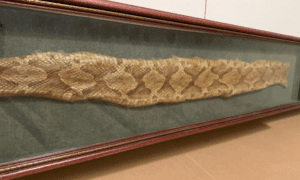The past two weeks, I have written columns concerning how to deal with our “enemies,” or anyone else who has troubled, hurt, or damaged us. The first was on forgiving those who wound us and the second was on blessing our enemies. I recommend those be read before starting on this one.
While this “weapon” in our arsenal is not always about our enemies (it can actually involve someone we love very much), the principle is the same. What do we do after we have forgiven and after we have blessed someone?
The answer is “release.” Let them go. Let it, whatever “it” is, go. Years ago, late at night, I was about to pray for a woman who had become very ill. My modus operandi at the time was to pray for someone’s healing until they either get better or die. She was sedated and didn’t even know I was in the room. Before I could begin, however, I felt a “check” — an internal voice that said “stop.” I knew that this battle was over. The die had been cast and she was going to die. So, I released her to God and His mercy and left the hospital. The next morning word came that she had died. She was a friend.
Another time, I prayed for a young minister who had taken over a church. It was a great deal of responsibility, much more than he had ever had before. For about a year and a half, I prayed for him every day. Then one day, it seemed that I was finished. It was odd. Until he called me and told me that he had resigned. I prayed a prayer of release and my year and a half was at an end. He, too, was a friend.
Twice I have prayed for people who I am quite certain didn’t desire my prayers and would have spurned them if they knew I was praying. In both cases, I had been praying the prayer of blessing (see last week’s column) over them, one of them for years and the other for a bit less than two years. These were enemies of me, or my ministry, or one of my family members. It had not been a struggle to forgive, as I have long-since learned that forgiveness is a choice better done sooner than later. It was, however, a struggle, at first, to pray blessings. It was terribly unfair, I thought, to ask God to prosper them when they were doing so much damage.
Although the two individuals had no knowledge of each other and though there were years in between the incidents, I lump them together because of the similarities. In both cases, when I sensed the impulse to stop praying and release them, I went cold on the inside. I knew there had been little, if any, change in their attitudes or their actions. I knew if they continued, there would be unfavorable results in their lives. Yet, I was finished. I had done what I was called to do and the time was over. In one case, I actually prayed that the person’s life would be spared as they had severe health issues. But, in both cases, I released them and went on my way.
When I say, “I released them,” that means that I gave them to God for whatever mercy, justice, or judgment He saw fit. That may sound presumptuous and perhaps even arrogant, but I do not mean it to be. I desired nothing bad to happen to either one. But, since “sowing and reaping,” (or “karma” or “what goes around comes around”) is pretty much a universal law, whatever happened — good or ill — was their own seeds germinating.
How long do we keep forgiving, blessing, and praying? Well, most people stop way too early because they can’t stand to do it. It takes commitment and perseverance to keep returning good for evil. We’d rather not. However, we grow in the process and the result of the battle is worth the fight. I can look back at the people that I have forgiven, blessed, and released with little or no regrets. There’s nothing more I could have or should have done.
When my father became ill with cancer, my mother was by his side constantly. It took about two years and several treatments and surgeries before the cancer spread to the brain. In his last months, Mom exhausted herself in his care. It took a toll. She was short-tempered (not with him but with everyone else), aggressive, and, I felt, inconsiderate of other family members. She had one goal — take care of Dad.
When he died, she was at the graveside as the casket was being covered up. We tried to get her to go to the car and wait but she refused. Someone brought a folding chair and she sat down. In silence, she watched the workmen fill in the grave, replace the sod, and finally put the flowers on the grave. Finished with their task, they respectfully withdrew. She sat, we stood, in silence for about a quarter hour more.
Finally, she said, “I guess I’ve done everything I can do.” She was right. She did. I cannot imagine that, in her mind, she left anything undone for my father. That’s the benefit of doing things the best way we know how.
The minister friend went on to excellent experiences and a wonderfully successful ministry. The other two I mentioned? Well, I really don’t know. I did what I knew to do and whatever happened after that isn’t my problem. Not anymore.
I am a pastor and have been for a long, long time. If avoiding heartache, pain, disappointment, and betrayal is what someone desires, they should follow another path. There’s a reason that 80% of the people who become pastors leave the field within five years. We have to learn to do what we proclaim: forgive everyone everything, bless those who actively try to injure us (and even do harm to our spouses and children), and then give it all to God. It’s too much for us to handle and He has big shoulders.
[David Epps is the Rector of the Cathedral of Christ the King (www.ctk.life). During the pandemics, the church is open at 10:00 a.m. on Sundays but is also live streaming at www.ctk.life. He is the bishop of the Diocese of the Mid-South (www.midsouthdiocese.life) He may contacted at [email protected].]











Leave a Comment
You must be logged in to post a comment.